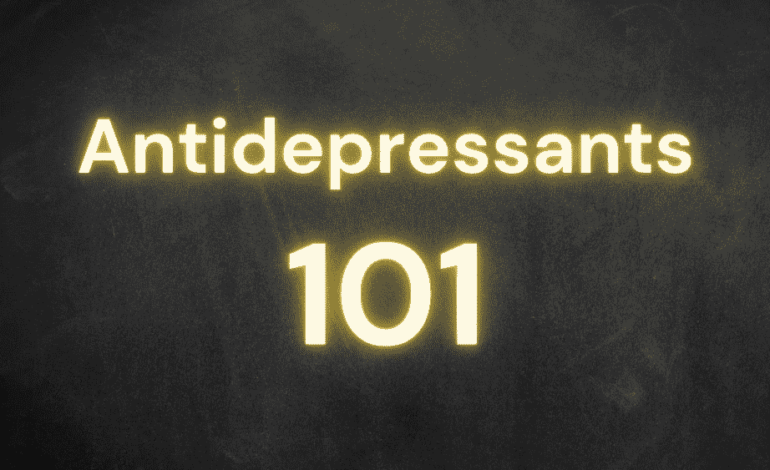If At First, You Don’t Succeed: The Do’s and Don’ts with Antidepressants
“You have a major depressive disorder, and I think you will benefit from starting a selective serotonin reuptake inhibitor (SSRI), a commonly prescribed antidepressant.”
This is a common phrase many doctors tell their patients who are struggling with depression.
If you have experienced depression, you most likely have seen a therapist or a physician who has told you that therapy and antidepressants are the best ways to get you back on track to living a healthier and more fulfilling life. Although this is true, each individual responds to therapy and antidepressants in their own unique way. You may find that a particular medication that worked for your co-worker did not work for you. You may find that some antidepressants trigger unwanted side effects. You may find that it takes going to three different therapists before you can find one that best fits your needs and comfort level. Learning to live with depression and finding the right combination of medication and therapy can be a steep learning curve for many. So, if you don’t succeed at first, remain patient and try again.
When Should I See A Doctor?
Although there is no “cure” for depression, studies show that the combination of therapy and medications, particularly selective serotonin reuptake inhibitors, have the best success rates for controlling symptoms associated with depression. Major depressive disorders affect approximately 17 million adults and 2 million children in the United States. Signs and symptoms of depression include:
- Feelings of guilt
- Poor concentration
- Difficulty sleeping
- Loss of interest in daily activities
- Changes in appetite and weight
- Feelings of hopelessness
- Unexplained physical aches and pains
- Feelings of guilt
- Decreased energy
These signs and symptoms can differ slightly in each individual and can come and go over time. However, when most of these signs and symptoms begin to interfere with your daily tasks consistently for at least two weeks, you most likely have a major depressive disorder. You should schedule a visit with your doctor or a mental health provider at this time.
When Will I Start To Feel Better?
No matter if you have been newly diagnosed with depression or have been struggling with this disorder your entire life, depression is never something you can get used to. It is normal to want to feel better right after you start treatment, but it is essential to understand that with any mental health disorder, treatment takes time. There is no magical cure, and relief does not come overnight. On average, antidepressants usually take 4-6 weeks before you start to notice an improvement in your mood. It is important to remain patient and continue going to therapy during this time.
What If I Don’t Notice Any Improvement?
If you have been taking antidepressants consistently for six weeks and have not noticed any improvement in your mood, your therapist or doctor may decide to increase your dose or switch to a different medication. Since treatment is different for everyone, this process can take time, and it may seem like trial and error before you find a medication that works for you. Remain patient and continue going to therapy. Even though your medications may change over time, it is important to maintain your therapy sessions.
What If My Symptoms Become Worse?
It is possible, especially for individuals under 24 years of age or younger, to experience worsening symptoms after starting a trial of antidepressants. Supposing you notice that your symptoms are deteriorating, or you are experiencing suicidal thoughts, racing thoughts, impulsive thoughts, or feelings of agitation or restlessness. In that case, you need to contact your doctor or therapist immediately. If the feelings become overwhelming, you can call 988 instead of 911 for mental health emergency help.
Don’t Give Up Hope
With the right combination of medication and therapy, you will begin to see the light at the end of the tunnel. It may take longer than you anticipated, and you may experience some unexpected turbulence, but learning to manage your symptoms over time can feel incredibly powerful. As you progress, you can try participating in hobbies and activities that you used to enjoy. Spend time with individuals who support you in your journey. Try following healthy living habits such as adopting a good sleep routine, a balanced diet, and a healthy exercise outlet. Join a community support group that focuses on depression and mental health disorders. This is a great way to bond with others, find strength in the power of community, and remind yourself that you are not alone. Keep in mind, that this is a marathon, not a sprint, so try to be patient with yourself, focus on the positive, and keep one foot in front of the other.
AKUA Mind and Body Treatment
AKUA Mind and Body is a full-service treatment program that offers a wide range of “east meets west” treatment modalities for many different populations struggling with mental health and substance use disorders. AKUA makes your recovery a priority.




